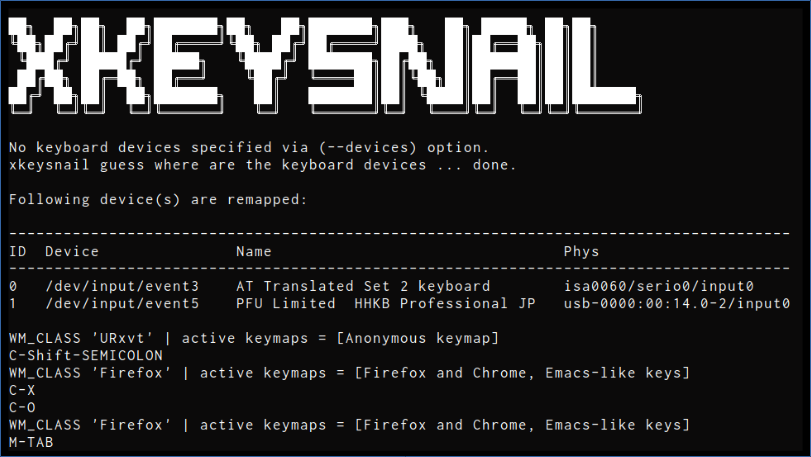xkeysnail is yet another keyboard remapping tool for X environment written in Python. It's like
xmodmap but allows more flexible remappings.
- Pros
- Has high-level and flexible remapping mechanisms, such as
- per-application keybindings can be defined
- multiple stroke keybindings can be defined such as
Ctrl+x Ctrl+ctoCtrl+q - not only key remapping but arbitrary commands defined by Python can be bound to a key
- Runs in low-level layer (
evdevanduinput), making remapping work in almost all the places
- Has high-level and flexible remapping mechanisms, such as
- Cons
- Runs in root-mode (requires
sudo)
- Runs in root-mode (requires
The key remapping mechanism of xkeysnail is based on pykeymacs
(https://github.com/DreaminginCodeZH/pykeymacs).
Requires root privilege and Python 3.
sudo apt install python3-pip
sudo pip3 install xkeysnail
sudo dnf install python3-pip
sudo pip3 install xkeysnail
# Add your user to input group if you don't want to run xkeysnail
# with sudo (log out and log in again to apply group change)
sudo usermod -a -G input $USER
git clone --depth 1 https://github.com/mooz/xkeysnail.git
cd xkeysnail
sudo pip3 install --upgrade .
sudo xkeysnail config.py
When you encounter the errors like Xlib.error.DisplayConnectionError: Can't connect to display ":0.0": b'No protocol specified\n' , try
xhost +SI:localuser:root
sudo xkeysnail config.py
If you want to specify keyboard devices, use --devices option:
sudo xkeysnail config.py --devices /dev/input/event3 'Topre Corporation HHKB Professional'
If you have hot-plugging keyboards, use --watch option.
If you want to suppress output of key events, use -q / --quiet option especially when running as a daemon.
(If you just need Emacs-like keybindings, consider to
use
example/config.py,
which contains Emacs-like keybindings).
Configuration file is a Python script that consists of several keymaps defined
by define_keymap(condition, mappings, name)
Defines a keymap consists of mappings, which is activated when the condition
is satisfied.
Argument condition specifies the condition of activating the mappings on an
application and takes one of the following forms:
- Regular expression (e.g.,
re.compile("YYY"))- Activates the
mappingsif the patternYYYmatches theWM_CLASSof the application.
- Activates the
lambda wm_class: some_condition(wm_class)- Activates the
mappingsif theWM_CLASSof the application satisfies the condition specified by thelambdafunction.
- Activates the
None: Refers to no condition.None-specified keymap will be a global keymap and is always enabled.
Argument mappings is a dictionary in the form of {key: command, key2: command2, ...} where key and command take following forms:
key: Key to override specified byK("YYY")- For the syntax of key specification, please refer to the key specification section.
command: one of the followingsK("YYY"): Dispatch custom key to the application.[command1, command2, ...]: Execute commands sequentially.{ ... }: Sub-keymap. Used to define multiple stroke keybindings. See multiple stroke keys for details.pass_through_key: Pass throughkeyto the application. Useful to override the global mappings behavior on certain applications.escape_next_key: Escape next key.- Arbitrary function: The function is executed and the returned value is used as a command.
- Can be used to invoke UNIX commands.
Argument name specifies the keymap name. This is an optional argument.
Key specification in a keymap is in a form of K("(<Modifier>-)*<Key>") where
<Modifier> is one of the followings
CorCtrl-> Control keyMorAlt-> Alt keyShift-> Shift keySuperorWin-> Super/Windows key
You can specify left/right modifiers by adding any one of prefixes L/R.
And <Key> is a key whose name is defined
in key.py.
Here is a list of key specification examples:
K("C-M-j"):Ctrl+Alt+jK("Ctrl-m"):Ctrl+mK("Win-o"):Super/Windows+oK("M-Shift-comma"):Alt+Shift+comma(=Alt+>)
When you needs multiple stroke keys, define nested keymap. For example, the
following example remaps C-x C-c to C-q.
define_keymap(None, {
K("C-x"): {
K("C-c"): K("C-q"),
K("C-f"): K("C-q"),
}
})To check WM_CLASS of the application you want to have custom keymap, use
xprop command:
xprop WM_CLASS
and then click the application. xprop tells WM_CLASS of the application as follows.
WM_CLASS(STRING) = "Navigator", "Firefox"
Use the second value (in this case Firefox) as the WM_CLASS value in your
config.py.
See example/config.py.
Here is an excerpt of example/config.py.
from xkeysnail.transform import *
define_keymap(re.compile("Firefox|Google-chrome"), {
# Ctrl+Alt+j/k to switch next/previous tab
K("C-M-j"): K("C-TAB"),
K("C-M-k"): K("C-Shift-TAB"),
}, "Firefox and Chrome")
define_keymap(re.compile("Zeal"), {
# Ctrl+s to focus search area
K("C-s"): K("C-k"),
}, "Zeal")
define_keymap(lambda wm_class: wm_class not in ("Emacs", "URxvt"), {
# Cancel
K("C-g"): [K("esc"), set_mark(False)],
# Escape
K("C-q"): escape_next_key,
# C-x YYY
K("C-x"): {
# C-x h (select all)
K("h"): [K("C-home"), K("C-a"), set_mark(True)],
# C-x C-f (open)
K("C-f"): K("C-o"),
# C-x C-s (save)
K("C-s"): K("C-s"),
# C-x k (kill tab)
K("k"): K("C-f4"),
# C-x C-c (exit)
K("C-c"): K("M-f4"),
# cancel
K("C-g"): pass_through_key,
# C-x u (undo)
K("u"): [K("C-z"), set_mark(False)],
}
}, "Emacs-like keys")In the Firefox location bar, go to about:config, search for ui.key.menuAcessKeyFocuses, and set the Value to false.
xkeysnail is distributed under GPL.
xkeysnail
Copyright (C) 2018 Masafumi Oyamada
This program is free software: you can redistribute it and/or modify
it under the terms of the GNU General Public License as published by
the Free Software Foundation, either version 3 of the License, or
(at your option) any later version.
This program is distributed in the hope that it will be useful,
but WITHOUT ANY WARRANTY; without even the implied warranty of
MERCHANTABILITY or FITNESS FOR A PARTICULAR PURPOSE. See the
GNU General Public License for more details.
You should have received a copy of the GNU General Public License
along with this program. If not, see <http://www.gnu.org/licenses/>.
xkeysnail is based on pykeymacs
(https://github.com/DreaminginCodeZH/pykeymacs), which is distributed under
GPL.
pykeymacs
Copyright (C) 2015 Zhang Hai
This program is free software: you can redistribute it and/or modify
it under the terms of the GNU General Public License as published by
the Free Software Foundation, either version 3 of the License, or
(at your option) any later version.
This program is distributed in the hope that it will be useful,
but WITHOUT ANY WARRANTY; without even the implied warranty of
MERCHANTABILITY or FITNESS FOR A PARTICULAR PURPOSE. See the
GNU General Public License for more details.
You should have received a copy of the GNU General Public License
along with this program. If not, see <http://www.gnu.org/licenses/>.
